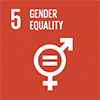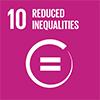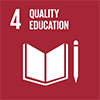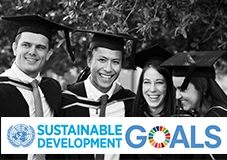Our university recognise our responsibility as an anchor institution in Western Sydney. We draw students from more than 160 ethnic backgrounds and higher than sector average of low socio-economic circumstances. The great majority of our students are the first in their family to attend University. Greater Western Sydney has one of the most significant urban populations of Aboriginal and Torres Strait Islander peoples and gives particular attention to supporting their aspirations. We celebrate and support all of the diverse and rich cultural communities that give Greater Western Sydney its energy and vibrancy.
We are working in many different areas across the institution to support different aspects of the Sustainable Development Goals. See more on SDG 13 Climate Action led primarily by research.
Gender Equality
 "Our goal [at Western Sydney University] is to promote and embed a gender-aware and gender-responsive culture that understands gender equality as a core value. That's our commitment." Professor Barney Glover, Vice-Chancellor and University President.
"Our goal [at Western Sydney University] is to promote and embed a gender-aware and gender-responsive culture that understands gender equality as a core value. That's our commitment." Professor Barney Glover, Vice-Chancellor and University President.
Some key initiatives include:
Representation
More than 50% of our students and staff are women. Almost half (47%) of our managers are women, and we have one of the highest rates of women professors (41%) in the sector.
Employer of Choice
Western Sydney University is an Employer of Choice for Gender Equality. This citation was awarded by the Federal Government's Workplace Gender Equality Agency (WGEA) on 25 February 2020. This marks 15 consecutive years that the University has received the award. Western Sydney University has sector-leading paid parental leave and return from maternity leave provisions, including a breast-feeding policy and flexible work arrangements. Our
Gender Equality Committee (opens in a new window) is driving the agenda and projects associated with this work, including:
- 20 weeks paid maternity leave
- 40 week paid phased return to work scheme
- 8 weeks parental leave
- Specific support for women in relation to applications for academic promotion
- Research support incentives for women
Women in Science and Engineering (WiSE) Program
The
Women in Science and Engineering (WiSE) Program (opens in a new window) began in mid-2015 and supports the career development of women studying degrees in STEM and increase the representation of women in these sectors. The program connects students with their peers, alumni, employers and mentors to build their professional skills and networks through a broad range of activities and events. They learn what they can do with their degree, get career advice, meet people working in their field, visit employers, go on study tours, attend conferences and workshops, develop their skills, receive job alerts, have business cards printed and meet other students socially. The programs has supported over 1,200 student since its inception.
Panel Pledge
Western Sydney University is proud to announce the
Western Panel Pledge (opens in a new window) — a new initiative to promote gender equality by ensuring equal gender balance at conferences and in other public forums. It is a personal commitment that calls on individuals to become a signatory and to actively promote gender equality. The Western Panel Pledge further extends the University’s commitment to impact gender equality across the higher education sector and the wider community.
Equity and Inclusion
 Western Sydney University is committed to creating an equitable and inclusive study and work environment for staff and students. We want to empower and promote the social, economic and political inclusion of all, irrespective of age, sex, disability, race, ethnicity, origin, religion or economic or other status.
Western Sydney University is committed to creating an equitable and inclusive study and work environment for staff and students. We want to empower and promote the social, economic and political inclusion of all, irrespective of age, sex, disability, race, ethnicity, origin, religion or economic or other status.
Western Sydney University was awarded the United Nations Academic Impact (UNAI) Hub for SDG 10: Reduced Inequalities in 2018-2021.
Some key initiatives include:
Widening Participation
Widening Participation Programs undertakes activities that contribute towards the Federal Government target that by 2020, 20% of higher education enrolments at undergraduate level should be from people from low socio-economic status backgrounds. For more than 25 years, Western has been committed to widening participation, resulting in a continuous rise in the number of students from non-traditional backgrounds. The most successful activities are those that have a ‘generational’ impact, making the children of first-generation higher education students more likely to consider further education. Our priority student groups include:
- Low SES backgrounds
- Aboriginal and Torres Strait Islanders
- Pacific Islander backgrounds
- Women (studying in non-traditional areas)
- Non–English speaking backgrounds
- New and emerging communities (refugee and asylum seeker backgrounds)
ITDS Assistive Technolgoies
Western is supporting over 1,500 students with disability with the launch a formal Academic Reasonable Adjustment Plan (ARAP), which includes almost 800 specific support activities or adjustments. One of these activities has deployed Sonocent, an Assistive Technology, to 240 students who have disability that impacts on their note taking skills in class. This has allowed increased autonomy and freedom from reliance on assistance. Supported by the Assistive Technology Specialist position within Information Technology Design Service which allows the University to better keep pace with the fast moving developments in higher education Assistive Technology and provide students with disability with the latest and most effective technological options.
Disability Collective
“Western has a long and proud history of supporting students and staff with disability to overcome barriers they face and we trust that this day highlights recognition for people with disability and their leadership potential for every day thereafter.”, Ms Vicky Reiner-Clark, Western SRC Disability Representative and Head of the Disability Collective
The Western Sydney Disability Collective was established in 2017 and is for students and carers who identify as having a temporary or permanent disability or medical condition such as sensory, intellectual, physical, mental and/or other disabilities or chronic health conditions. The role of the Disability Collective is to remove discrimination based on having a disability and engage in activities and advocacy that will further develop representation of students with disabilities at Western. It also serves to assist students with a disability to have a presence in student representation. All of our representatives are persons with disability of varied limitations and academic degree program elected on an annual basis by their peers within the university. Their initiatives include:
- Advocating via their Sustainable Campus Strategy for new builds to be fully accessible and design for all people
- Holding representative positions on a number of university committees
- Supporting and networking with multuple internal and external stakeholders
- Commitment to all the SDGs and Disability Inclusion Plan in all their advocacy campaigns
LGBTIQA+
The University is committed to creating an inclusive, safe and respectful place of study and work and highly values the diversity of our staff and students, including LGBTIQA+ staff and students. We were one of the first Australian universities to introduce a long-term whole-of-university strategy on improvements for sexuality and gender diverse students, staff and community.
The Ally Network is an endorsed group of staff and students who are committed to creating an inclusive and respectful culture at the University for lesbian, gay, bisexual, transgender, intersex and queer (LGBTIQA+) community members. They provide training so staff and students can become an approved Ally rep, as well as background information on the diversity of sexual and gender expression, the issues and needs of LGBTIQA+ staff and students, and concepts such as homophobia and heterosexism. We have over 100 staff and students trained as “Allies” who are LGBTIQA+aware and friendly, endorsed by the University to provide LGBTIQA+-related information and/or support.
Aboriginal and Torres Strait Islander
 The University’s broader Aboriginal and Torres Strait Islander Strategy, launched in early 2020, is led by Professor Michelle Trudgett, Deputy Vice-Chancellor, Aboriginal and Torres Strait Islander Education, Strategy and Consultation (opens in a new window). The new strategy underscores the University’s commitment to increase employment, education, research and engagement at Western Sydney University.
The University’s broader Aboriginal and Torres Strait Islander Strategy, launched in early 2020, is led by Professor Michelle Trudgett, Deputy Vice-Chancellor, Aboriginal and Torres Strait Islander Education, Strategy and Consultation (opens in a new window). The new strategy underscores the University’s commitment to increase employment, education, research and engagement at Western Sydney University.
Some key initiatives include:
Representation and Support
In 2017, there are more than 660 students who identified as being of Aboriginal and/or Torres Strait Islander descent studying at Western Sydney. This number has been increasing steadily over the last five years. We support our students through the Badanami Centre and provide them with programs, services and facilities to encourage and support their involvement in all aspects of tertiary education, including the Tutoring For Success (TFS) program and the Alternative Entry Program (AEP).
Schools Engagement Programs
Heartbeat is a program for Aboriginal and Torres Strait Islander students in Year 3 to Year 6. The program raises students’ awareness of health issues, inspires students to take up careers in health, medicine and related-sciences and showcases the university as an inclusive place for them. More than 1,500 Aboriginal and Torres Strait Islander students from 55 schools in the Blacktown, Campbelltown and Penrith regions have participated since its launch in 2010. Each Heartbeat event also involve Western Sydney University Aboriginal or Torres Strait Islander students from relevant degrees in Medicine, Nursing, Health and Sciences. These students act as guides for groups during event days and talk about how they came to study at university.
Pathways to Dreaming is another school-based program designed to engage Aboriginal and Torres Strait Islander students in Year 8 to Year 12. Mentored by current Western Sydney University students and alumni high school students are supported and encouraged to achieve their educational aspirations.
Postgraduate Scholarships
Western Sydney University announced a refreshed scholarship program in 2020 – including three PhD scholarships valued at $50,000 per year – to support Aboriginal and Torres Strait Islander students undertaking higher degree research. These scholarships are among the largest for Aboriginal and Torres Strait Islander Higher Degree Research students in Australia.
Yarramundi Lectures
The Yarramundi Lecture series was established over two decades ago out of respect and recognition of the Darug people and has become central to the University’s longstanding commitment to its Aboriginal and Torres Strait Islander communities. The forums are linked it to events affecting First Peoples in Australia’s modern history and discusses the of issues of local and national importance. View the
commemorative Yarramundi Lecture e-book (opens in a new window).

 "Our goal [at Western Sydney University] is to promote and embed a gender-aware and gender-responsive culture that understands gender equality as a core value. That's our commitment." Professor Barney Glover, Vice-Chancellor and University President.
"Our goal [at Western Sydney University] is to promote and embed a gender-aware and gender-responsive culture that understands gender equality as a core value. That's our commitment." Professor Barney Glover, Vice-Chancellor and University President. Western Sydney University is committed to creating an equitable and inclusive study and work environment for staff and students. We want to empower and promote the social, economic and political inclusion of all, irrespective of age, sex, disability, race, ethnicity, origin, religion or economic or other status.
Western Sydney University is committed to creating an equitable and inclusive study and work environment for staff and students. We want to empower and promote the social, economic and political inclusion of all, irrespective of age, sex, disability, race, ethnicity, origin, religion or economic or other status.

